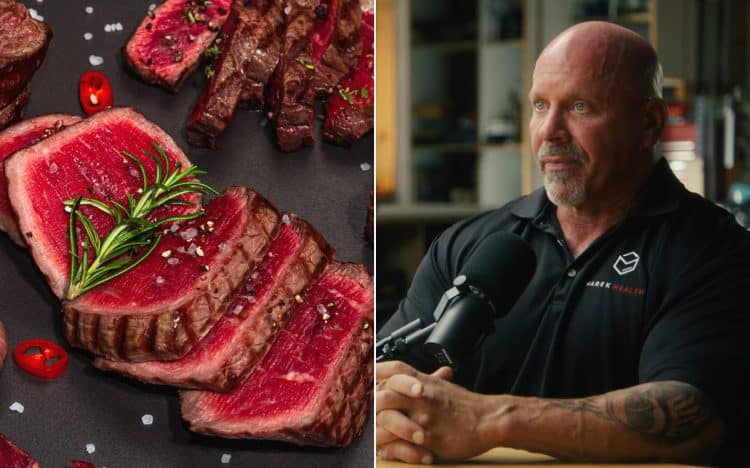Nutrition coach Stan Efferding is back to eliminate a few misconceptions spreading around the fitness world. In a recent interview with Chris Williamson, Efferding explained why red meat and aspartame are not dangerous to consume and discussed different strategies for achieving a calorie deficit.
In addition to his diet and nutritional expertise, Stan Efferding was a mastermind when he trained, having made waves both as a notable powerlifter and bodybuilder. His crowning achievement came in 2010 when he won the World’s Strongest Pro Bodybuilder Mr. Olympia title. He eclipsed the previous record by almost 100 pounds.
Widely considered to be one of the most powerful bodybuilders on the planet, “The White Rhino” has carried his strength well into his 50s and recently showed as much with a stiff-bar raw deadlift of 635 pounds using a double hook grip.
Efferding has taken pride in his customized nutrition plan he calls “The Vertical Diet.” He designed a flexible program for those who demand a higher amount of calories per day. In retirement, he remains dedicated to helping advance the fitness pursuits of his clients.
Stan Efferding Discusses Meat Safety and Dietary Patterns
According to Stan Efferding, a lack of protein poses a greater mortality risk than consuming red meat regularly.
“What’s the dietary pattern, are you eating a ton of really fatty meats, bacon, butter is usually thrown into that group even though it’s not a meat, tons of rib-eyes, and are you susceptible? What’s your body composition, what’s your exercise look like, are you consuming sufficient fiber?” said Stan Efferding.
“Mtor stimulation, there’s a difference between acute and chronic inflammation or mtor inflammation. Acute inflammation or acute stimulation of mtor doesn’t seem to be a problem. That would be the same protein in general. That wouldn’t be specific to red meat.
Any protein would stimulate mtor. The problem that you get is as we age, we become anabolically resistant at some point or less and less anabolically sensitive. And a lot of people as they age they suffer from, they don’t eat enough protein and suffer from sarcopenia, and that can be a bigger problem for mortality risk than consuming red meat or any meat for that matter,” said Stan Efferding.
Efferding Says Aspartame Is Safe & Calorie Deficits Still Work With Junk Food
Efferding cited randomized control trials that reported weight loss and improved health outcomes in people who replaced sugar-sweetened beverages with diet sodas.
“As part of a healthy diet, watching your LDLs, the only other concern would be cancer, you mentioned the World Health Organization — I find it interesting now. We have this big blowback on aspartame. They came out and said aspartame was associated with cancer risk. My read is that they looked at mouse studies with huge doses, it’s not their job to look at doses, so I think…
It was something like 800 Cokes per day to a day to get that level of aspartame. But the point of that story is – and none of the nutrition PHDs which is the people I usually turn my ear towards when this comes out, none of them consider this to be a concern. We do have plenty of human trials, randomized control trials showing evidence that when you replace sugar-sweetened beverages with diet sodas you see weight loss and therefore improved health outcomes.”
Regardless of the quality of food, Efferding emphasized that calorie deficits and calorie restriction patterns are the most important factors in dropping weight.
“I said that 95% of health benefits are realized strictly from weight loss itself irrespective of diet. I referenced the McDonald’s diet. We have multiple studies now. The McDonald’s diet, the Twinkie diet, the 7-11 diet, when people eat quote unquote junk food, fast food…
When they’re able to maintain a calorie deficit and lose weight, they see decreases in all of their biomarkers. They see lowered cholesterol, lower blood sugar, lower blood pressure, and weight loss itself we know is associated with decreased cancer risk. That should be the primary goal: weight loss. Obviously, those kinds of diets long-term,” said Efferding.
“All of them [diets] result in a calorie deficit. One is calorie restriction, that’s when you’re counting calories, you’re checking the labels and weighing and measuring food, and using your little computer or phone to track your calories. That’s one method of controlling calories.
The other one is time restriction. You just eat with like a 16-8 or that doesn’t work for you, an 18-6 or a 24 until you can’t eat enough calories in your window to gain weight and you start losing weight. Another one would be dietary restriction, where you eliminate foods, like Keto, getting rid of carbs.”
This hadn’t been the first time Stan Efferding opened up about diets and nutrition. In a special appearance on Muscular Development’s The Menace Podcast, Efferding joined Dennis James to elaborate on his Vertical Diet. He also reflected on some of his injuries and the best lifts he managed to accomplish in his prime.
While certain diets and nutritional restrictions have their value, Stan Efferding believes above all else that controlling the amount you consume is far more important than what you consume.
RELATED: Stan Efferding Talks Training w/UFC HW Champ Jon Jones: “He Prepares for Everything”


